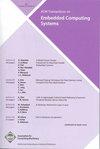面向小芯片的小花:用于CNN推理任务的数据流感知的高性能节能网络-中介器
IF 2.8
3区 计算机科学
Q2 COMPUTER SCIENCE, HARDWARE & ARCHITECTURE
引用次数: 0
摘要
2.5D芯片平台的最新进展为新兴的计算和数据密集型应用(包括机器学习)的紧凑扩展实现提供了新的途径。中间层网络(NoI)可以在2.5D系统上集成多个小芯片。虽然这些多核平台可以通过并发运行多个专门任务来提供高计算吞吐量和能源效率,但传统的NoI架构由于其固有的多跳拓扑结构而具有有限的计算吞吐量。在本文中,我们提出了一种基于空间填充曲线(sfc)的新型NoI架构小花。小花架构利用适当的任务映射,利用数据流模式,优化芯片间数据交换,为并发运行的多种类型卷积神经网络(CNN)推理任务提取高性能。我们证明,在同时执行涉及多个CNN任务的数据中心规模的工作负载时,与最先进的NoI架构相比,小花架构将延迟和能量分别降低了58%和64%。Floret通过利用CNN推理任务的数据流感知,实现了高性能和显著的节能,并且降低了制造成本。本文章由计算机程序翻译,如有差异,请以英文原文为准。
Florets for Chiplets: Data Flow-aware High-Performance and Energy-efficient Network-on-Interposer for CNN Inference Tasks
Recent advances in 2.5D chiplet platforms provide a new avenue for compact scale-out implementations of emerging compute- and data-intensive applications including machine learning. Network-on-Interposer (NoI) enables integration of multiple chiplets on a 2.5D system. While these manycore platforms can deliver high computational throughput and energy efficiency by running multiple specialized tasks concurrently, conventional NoI architectures have a limited computational throughput due to their inherent multi-hop topologies. In this paper, we propose Floret, a novel NoI architecture based on space-filling curves (SFCs). The Floret architecture leverages suitable task mapping, exploits the data flow pattern, and optimizes the inter-chiplet data exchange to extract high performance for multiple types of convolutional neural network (CNN) inference tasks running concurrently. We demonstrate that the Floret architecture reduces the latency and energy up to 58% and 64%, respectively, compared to state-of-the-art NoI architectures while executing datacenter-scale workloads involving multiple CNN tasks simultaneously. Floret achieves high performance and significant energy savings with much lower fabrication cost by exploiting the data-flow awareness of the CNN inference tasks.
求助全文
通过发布文献求助,成功后即可免费获取论文全文。
去求助
来源期刊

ACM Transactions on Embedded Computing Systems
工程技术-计算机:软件工程
CiteScore
3.70
自引率
0.00%
发文量
138
审稿时长
6 months
期刊介绍:
The design of embedded computing systems, both the software and hardware, increasingly relies on sophisticated algorithms, analytical models, and methodologies. ACM Transactions on Embedded Computing Systems (TECS) aims to present the leading work relating to the analysis, design, behavior, and experience with embedded computing systems.
 求助内容:
求助内容: 应助结果提醒方式:
应助结果提醒方式:


